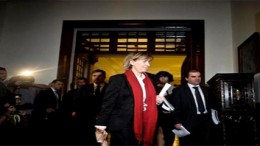The EU is a union of rules, not a union of force
The European Union (EU) is a group of sovereign states, who are sovereign in that they are entirely free to leave the EU. This freedom to leave means the EU is not a “super state.” There is no coercive force — and no EU army — to make Britain or any other country remain in the union. Britain enjoys a freedom, within the EU, that colonies did not enjoy within the British or other European empires. Britain is, therefore, entirely within its rights in considering the option of leaving the EU, although that does not mean such a course would be wise.







